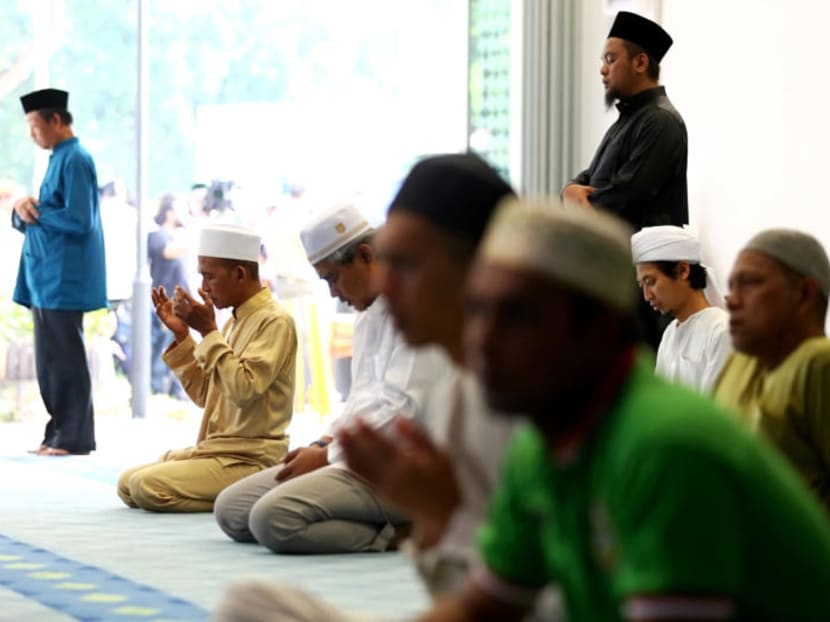Essential to engage millennial Muslims online as fewer of them go to mosques
SINGAPORE — With fewer Muslim youth going to the mosques for religious classes according to Government statistics, Law and Home Affairs Minister K Shanmugam said it is essential to engage the millennial generation online on mainstream Islamic teaching in a bid to compete for their hearts and minds.
SINGAPORE — Noting the declining trend of younger Muslims going to the mosques for religious guidance, Law and Home Affairs Minister K Shanmugam said more can be done to engage millennials online in a bid to win over their hearts and minds.
And to counter exclusivist ideologies that are easily accessible online, the Mufti of Singapore Dr Mohamed Fatris Bakaram said religious content that appeal to the masses, especially tech-savvy millennials, must be developed.
Speaking on Saturday (Oct 7) at a seminar on strengthening religious resilience, Mr Shanmugam said that amid the racial and religious strifes in neighbouring countries such as Myanmar and the Philippines, Singapore cannot let its guard down.
And Islamic religious scholars and teachers, he noted, play a critical part to provide religious guidance and advice to the youth.
Although Government statistics showed that older Muslims go to mosques and listen to sermons, “the younger people are not going so much”, said Mr Shanmugam.
“The young people today don’t accept (guidance) just because it comes from an older person. Because your hair is grey, doesn’t mean they accept (it),” he noted.
“We have to work with the young millennial generation and try and persuade them, and that means being able to be tech savvy, going online, competing for their hearts and minds."
Although it will be a challenge to attract youth to mosques to receive religious guidance, Mr Shanmugam said the Government will work with the Malay-Muslim community to address this. The ultimate goal, he added, is to have people who are “religious, good and confident about themselves”.
Echoing a similar sentiment, Dr Fatris noted that religious teachers or asatizahs are no longer expected to preach solely in mosques and religious classes. Their task now is also to influence the youth to “choose us as their choice of receiving religious guidance and instructions”.
“In order for us to do so, our approach to religious learning must continue to be relevant, one that makes sense to them in leading their lives in today’s post-modern society,” he said.
Dr Fatris noted that asatizahs should also instill critical thinking in students when discussing doctrines or concepts from the classical texts such as khilafah or Islamic leadership, which have been misconstrued by the Islamic State.
It is key to question the fundamentals of these concepts as they were “not formulated in isolation of their respective social and political contexts of the time”, said Dr Fatris. “We need to dig deeper into our texts and critically examine the discourses”, he added.
On that note, the Religious Rehabilitation Group (RRG) has published a book called “Journey to the Path of Truth”, which contains 15 essays written by 16 of its members.
Some of the essays sought to dispel misinterpretations of Islamic concepts by terrorists groups, while others touched on the challenges dealing with youth radicalisation and helping them to be more discerning.
About 2,000 copies of the book have been printed, with more to come in the coming months. They will be distributed to all 70 mosques here as well as uploaded on the RRG’s website and Facebook page.
The objective of the book is to get the community to reject extremism and that their loved ones are not “easily swayed by the ideas of extremists”, said the group’s vice-chairman Dr Mohamed Ali, who is also a terrorism expert at the S. Rajaratnam School of International Studies.
Pointing out that with various online channels for youth to seek religious guidance, Dr Ali said that mosques need to come up with creative concepts to draw them.
Previously, TODAY had reported that some mosques have come up with creative initiatives in a bid to appeal to the millennials.
For instance, Al-Ansar mosque conducted a “social experiment” in July involving some 60 youth participants to test whether Singaporeans care about cleanliness. It was filmed and posted on the mosque’s Facebook page, where it garnered over 24,000 views and more than 420 shares.
Mr Abdul Manaf Rahmat, who is a senior religious officer at Kassim Mosque, said that mosques can try to organise more outdoor activities to attract youth and use such platforms to incorporate religious guidance at the same time.







